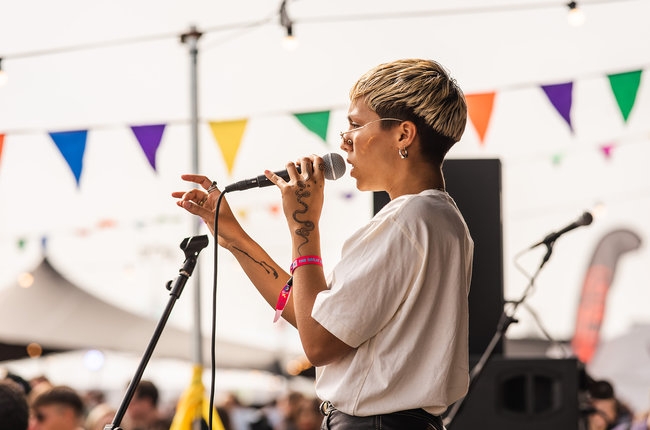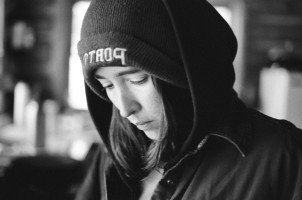Brighton’s Great Escape festival closed out Saturday (May 19) with a number of panels and discussions addressing mental health issues and ways to help push the music industry, and the 500 artists playing the U.K. event, forward.
The recent suicide by dance music pioneer and performer Avicii was often cited during the three-day event, which included the first ever “Safe Tents” created by U.K.’s Music Support at the Queen's Hotel. Musicians and music professionals were encouraged to visit the safe tent suite to relax or talk to Music Support volunteers while overlooking the pier and the sea.
“Every time I explained what Music Support was and what we were doing here, there was a widespread feeling of ‘this is amazing’ and ‘this is such a great initiative that’s really needed,’” says Music Support volunteer Simi Bhullar. “I don’t think people are aware of how widespread it is because there is still so much taboo around it. The music industry is one of those many industries where you have to just close your mouth and get on with it.”
Music Support has already provided safe tents to a dozen major U.K. festivals and offers a 24-hour hotline staffed with industry professionals. The organization also visits labels and educates them on how to prevent and/or see the signs of addiction, mental health complications and burnout.
“Burnout has to be one of the biggest issues for people that I have spoken with and a lot of people being afraid to be honest that they are having a difficult time,” says Music Support volunteer Joanne Croxford. “They are afraid they are going to lose their job especially with touring musicians or freelancers. They think they are so easily replaceable.”
While artists have recently been more vocal about mental health issues surrounding touring such as lacking routine or heavy drinking and drug use, industry professionals behind the scenes are also suffering from the same ills.
“There are many people around musicians who are doing the same thing but not being on stage at the end of the night that need that support as well,” says Bhullar. “That is an area we need to look into and keep recognizing.”
From coffee shop/pub/record store Dead Wax Social, Eventbrite hosted a panel on how event organizers have been using the demand for live events to make a difference. The Party With a Purpose discussion brought Great Escape delegates out to the punk shop with spray painted walls to talk about the demand for socially conscious events.
“I think that one of the main things that’s happening is that people are directing their audiences more. People are realizing that their consumers are complex. People want to party to 5 a.m. and still hear a mind-enhancing talk in the afternoon. You don’t just pigeonhole people,” said panelist Rhodri Jones of Southbank Centre.
Jones added that he worked with musician Frank Turner on a handful of shows and arranged round table talks about mental health with the eager fans.
“Having a festival with a cause isn’t necessarily going to get you a cheap rate on an artist, but if an artist wants to do something that’s always a great first step,” Jones said from Dead Wax Social. “Often it can be a flattering thing to an artist to say we want to hear your point of view on that topic.”
Different discussions at the Great Escape emphasized the importance of not placing all the pressure on artists to direct or influence the social agenda. The desire for inclusion riders or diversity charters was brought up at the Opportunities in Independence panel presented by Keychange from the PRS Foundation at the Old Courtroom in Brighton.
“It is a lot to put on an artist because of the paradigms of it all. When you are a very established artist, you can make decisions and those decisions will have a powerful impact,” said Beggars Music Publishing’s Managing Director Amy Morgan. “I wouldn’t want to judge an artist because they did whatever they had to do at that point and they are young. It is hard enough as it is.”
At the same panel, soulful jazz singer and musician Poppy Ajudha stressed the difficulties of putting her foot down as a female artist, whether it comes to diversity or just her craft. Ajudha, who participated in the discussion prior to captivating an audience at the Dr. Martens stage on Friday night (May 18), explained how uncomfortable recording can be for female musicians surrounded by men throughout the process and called for more women in tour managing, crews, studios and on labels.
“It can be quite isolating,” Ajudha said of the male-dominated spaces. “Women, we don’t take account of our successes. We aren’t assertive. If you don’t believe in yourself, no one else will. People believe you if you believe yourself.”
Vanessa Reed, CEO of PRS Foundation, echoed that sentiment at the Future of Gender Representation on Festival Line-Ups panel held at the historic Brighton Dome. Reed brought up the example of Florence + the Machine taking over the headlining spot at Glastonbury after Foo Fighters' Dave Grohl broke his foot.
“No one believed she was ready. She didn’t believe she was ready. I think that sums up where we are with the perception of female headliners,” Reed said.
PRS Foundation has been tracking the growth of female participation in the music industry, and Reed explained that the percentages are rising, but festival lineups haven’t caught up.
“The reason there is an outbreak on social media about festival lineups is because there are loads of young people who don’t understand why that should be the case,” Reed said. “Loads of young people know loads of young female artists that they are excited by. The fact that we have, more or less, the same industry workforce is why we’ve got, more or less, the same programming.”








